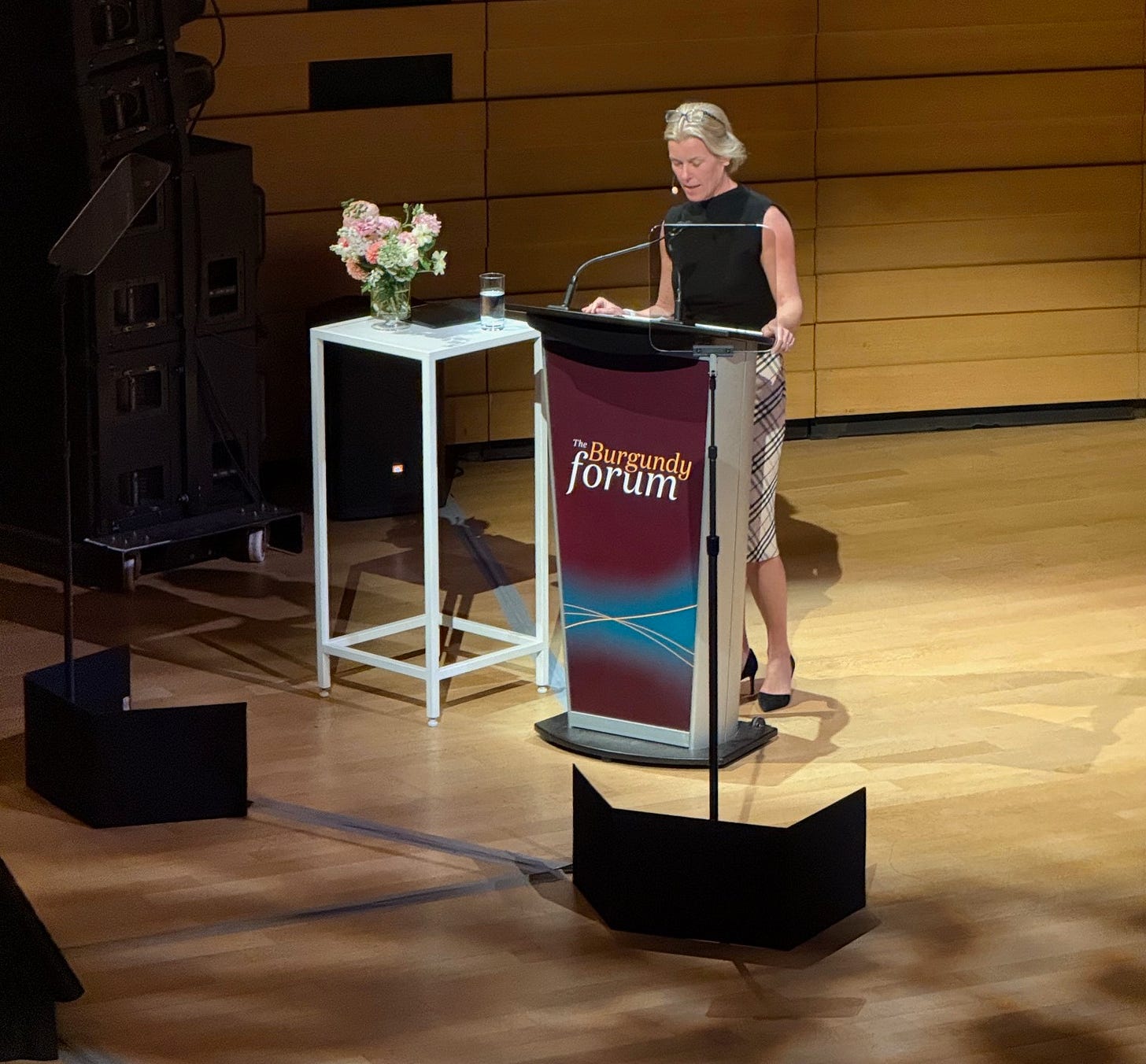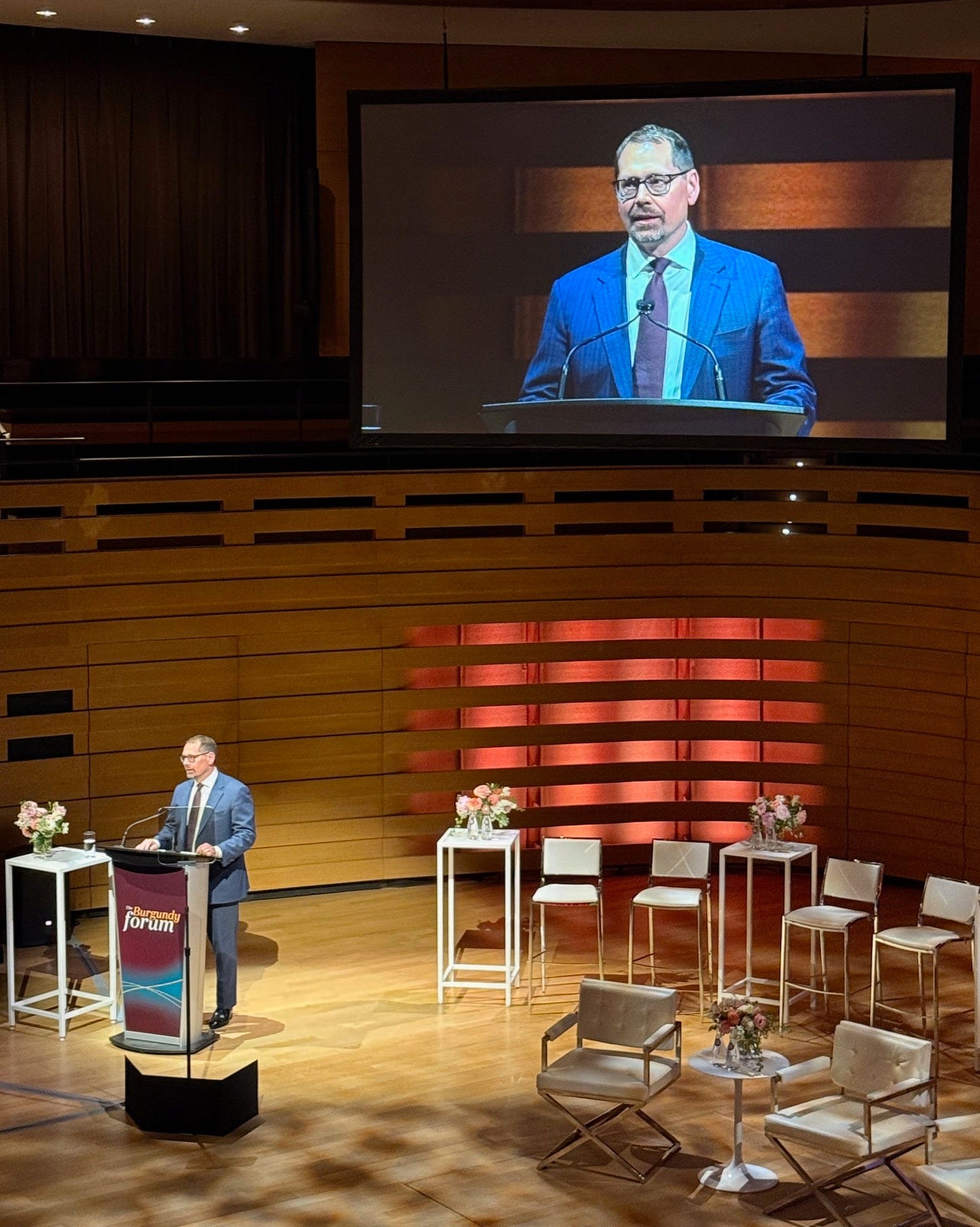Last week, I attended Burgundy’s annual forum in Toronto—a quiet powerhouse gathering for serious investors. This year’s theme, “Staying Global in a Deglobalizing World,” felt particularly timely. Two keynotes stood out and made me rethink what diversification actually means in a world where capital, narratives, and attention are all getting a little more domestic.
My takeaway? In a fragmented world, the best investment approach is still the simplest one: focus on compounding. Good businesses, bought at reasonable valuations, held through the cycles. Businesses that create value, adapt, and keep going—especially when markets get choppy. And they will get choppy. As one speaker put it: we’re all bound to pass through rough seas. That’s a feature of long-term investing, not a bug.
🔍 Rethinking Diversification – Anne Mette de Place Filippini
The second keynote came from Anne Mette de Place Filippini, CIO at Burgundy, and she did not disappoint. With a calm but pointed delivery, she challenged several lazy assumptions in investing today.
One of her early comments—half joke, half truth—set the tone:
“Why not invest in more of the winners and less of the losers?”
A 20/20 insight, of course, but a reminder that performance attribution often comes with hindsight and that conviction needs to be earned in real time, not retroactively justified.
She revisited diversification—not as a spreadsheet exercise, but as a principle of humility. To quote Buffett, “Diversification is protection against ignorance,” but Anne Mette was quick to point out: not at the cost of understanding. Diversification only works if you understand what you own, why you own it, and how each piece contributes to the whole.
Her skepticism of endowment-style investing was striking. Too much complexity, too many fees, and not enough transparency. Institutions chasing premium returns with premium structures, but with no actual premium showing up in the results. It’s a good reminder: complexity doesn’t equal quality, and diversification without clarity can actually destroy value.
She pointed to opportunities outside the U.S.—in smaller and mid-sized companies, and in regions that don’t dominate the headlines. Today, U.S. stock markets are lagging, even as the U.S. economy is supposedly stronger than Europe’s. So much for American exceptionalism. There’s a large hunting ground in the rest of the world, filled with underappreciated opportunities just waiting to be discovered.
She emphasized that investing isn’t about chasing market trends, but about recognizing that price is not the same as value. That achieving balance doesn’t mean swinging between extremes, but rather holding firm to discipline through volatility. From volatility comes the ability to compound—and that’s where the real value lies.
🌍 Europe: Relic or Rising Opportunity? – Kenneth Broekaert
The third keynote, delivered by Kenneth Broekaert, SVP and Portfolio Manager, brought a slightly different flavor to the day: more narrative, more history, and even a touch of dry humor. He posed a provocative question:
“Europe: relic or rising opportunity?”
Since Liberation Day, he said, investors have asked themselves whether they were too concentrated in the U.S. That question is still relevant—and increasingly worth revisiting.
Kenneth’s answer was unequivocal: Europe is not just relevant—it’s robust. It houses some of the best companies in the world, particularly in healthcare, consumer goods, and industrials. Many of these businesses are leaders in their categories and geographies. They benefit from real scale—like Heineken 0% leveraging Verstappen in global advertising—and they’ve built resilient models with high recurring revenues and limited exposure to global supply chain disruptions.
His preference? Companies that produce where they sell—a structural edge in an era of tariffs and fractured trade routes.
He made the case that European equities offer stability, lower valuations, and higher dividends—a rare combination in today’s market. Healthcare companies, in particular, provide essential products in every economic environment. Industrial firms in Europe are often treated as boring—but boring with recurring revenue can be a beautiful thing when you're looking to compound earnings over time.
What struck me most was Kenneth’s quiet confidence in the compounding power of European returns. Not as a contrarian bet, but as a smart, grounded strategy for investors willing to go beyond headlines and lean into fundamentals.
🎯 Final Thought
In a world turning inward, looking outward may be the edge.
Staying global doesn't mean owning “the market.” It means owning what compounds.
And more often than not, that means looking beyond what’s obvious.
Peggy Van de Plassche is a seasoned advisor with over 20 years of experience in financial services, healthcare, and technology. She specializes in guiding boards and C-suite executives through transformational change, leveraging technology and capital allocation to drive growth and innovation. A founding board member of Invest in Canada, Peggy also brings unique expertise in navigating complex issues and fostering public-private partnerships—key elements in shaping the Future of Business. Her skill set includes value creation, strategic leadership, capital allocation, transaction advisory, technology integration, and governance. Notable clients include BMO, CI Financial, HOOPP, OMERS, GreenShield Canada, Nicola Wealth, and Power Financial. For more information, visit peggyvandeplassche.com.






